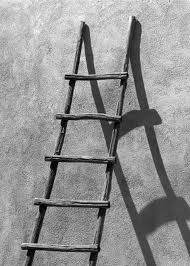When the Ladder of Success Leans Against the Wrong Wall
“People may spend their whole lives climbing the ladder of success only to find, once they reach the top, that the ladder is leaning against the wrong wall.” The wisdom—and wit—of Thomas Merton.
We all climb that ladder. There is probably something wrong with you if you don’t. And there are lots of ladders. Young people sometimes denounce the ladders they see their parents and the generation above them mounting. But there’s nothing salvific about exchanging a bourgeois ladder for a bohemian ladder, aiming to be the next Bono instead of the next Buffet. There are ladders that scale the heights of movies and music and dance and painting. Ladders to the top of non-profits and churches and charities.
Everybody’s on some ladder.
The mystery and wonder of God’s salvation is, it only kicks in once you get a few rungs up your personal favorite and realize that it’s leaning against the wrong wall. You have to fail. Your own personal improvement project has to crap out. That’s the only moment in which a human being is ready and willing to receive grace. (There are no exceptions to this rule. Apparent exceptions are usually people with high control needs, too fearful to climb and fall.)
Unless you bury your talent and withdraw from life, there’s no way to avoid the ladder climbing. I imagine God watching us, the way all parents watch their children, knowing we must set out to find our way, knowing we must take wrong turns and ascend wrong ladders leaning against wrong walls, and waiting for us to fall—so that God can catch us in those Everlasting Arms.
The only caveat in Merton’s observation are those four words, “spend their whole lives.” At some point you’re supposed to wake up to the wrongness of the ladder and the wall. At some point we take a tumble, and God reaches out to catch us, to enfold us in mercy—and for the first thirty or forty years we push away and say, “No thank you. I don’t need any help. I can do this—I really can. Watch me.” And we go back at those rungs. But you don’t want to spend your whole life doing that.
Pray for the grace, when the time comes, to be caught by those Everlasting Arms, and not to push away.

I wish I were there, but I’m not… yet.
AMEN DAVID!! clark
Very eloquently put. It also occurs to me that sometimes after falling off one ladder we try to climb up another (or maybe we can’t help it, as you say) wondering if you can accept God’s help and still get back on a ladder!!…all very interesting!
I thought that ladder quote was from Stephen Covey? are you positive it was from Thomas Merton?
I read it somewhere as Merton. Would love to be set straight if I’m wrong on this. Thank you!
It seems to be most frequently quoted as by Merton. Possibly Covey had read it (hadn’t he read just about everything?) when he said, very similarly, “Management is efficiency in climbing the ladder of success; leadership determines whether the ladder is leaning against the right wall.”
Covey popularized the quote from Merton according to Quote Investigator
“People may spend their whole lives climbing the ladder of success only to find, once they reach the top,there is nothing there!
That is right, but bigger dilemma occurs when you realise this after retirement. People think you have been successfull, but you have a vacuum and loneliness inside.
You are at loss
So true–retirement is a huge transition where these issues surface.
I thank you for this wisdom.
The only ladder strong enough to hold me up in life has been in the shape of a cross, and held together by 3 nails.
If they reached at the top it’s not the wrong ladder.
Wrong ladder never makes to the top.
Thanks for your comment!